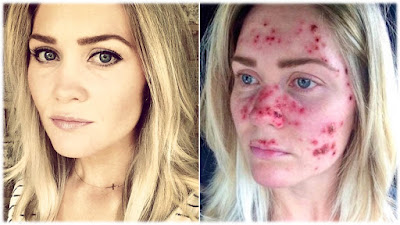Dr. Wu Young, Department of Dermatology, Mecca Memorial Hospital:
I sometimes see people on the internet asking me, what should I do if I, my friends or relatives have skin cancer? If it is really unfortunate then most of them can be cured effectively till the initial treatment. Since the treatment is related to the type of skin cancer, here is a brief introduction to each. First, let's take a look at the incidence of skin cancer in China.
 |
| skin cancer |
Incidence of skin cancer in Taiwan:
In the Cancer Registration Reports released by the Department of Health over the last few years, we have found that in the first ten cancers, the incidence of skin cancer in men and women is 8-9, respectively. From the Taiwan Cancer Registry data, we can also see that the incidence of skin cancer is increasing year by year. As of 1995, there were 2,457 people, an increase of almost 10 times.
Skin cancer is more common in elderly patients, so the increase in incidence may be due to factors such as age of the population, increase in medical opportunities, and increase in medical needs. Develop medical treatment and improve diagnostic skills. Since most skin cancers can be detected early, treated early and the cure rate is high, although the number of early diagnosed skin cancer cases is increasing year by year, skin cancer every year The number of deaths due to is limited to a certain number, and the death rate is very low. For other cancers. Therefore, it is important to understand the early symptoms of skin cancer. Chinese people should not ignore the spots on the skin.
Types of skin cancer:
Skin cancer can be divided into different types according to the origin of the cancer cells. The incidence of different skin cancers is related to the structure of the skin. The skin is the largest organ of the human body. There are many types of cells that can cause cancer to grow. The most common are keratinocytes and melanocytes from the epidermis, as they are the first line of tissue exposed to sunlight. Long-term exposure to ultraviolet light can cause cancerous changes in these cells. Basal cell carcinoma or squamous cell carcinoma appears when keratinocytes become abnormally cancerous. Basal cell carcinoma is the most common skin cancer in Taiwan, accounting for about 45-50%.
The second most common is Lund cell carcinoma, which accounts for about 27% of skin cancers in Taiwan. If squamous cell carcinoma is discovered too late and treated too late, it will invade the blood vessels or lymphatic vessels of the skin, causing tumor cells to metastasize to the lungs, liver, bones and Enters other organs, making treatment more difficult. Death rate. However, if it is found early, the success rate of surgical treatment will be higher.
The third most common type is melanoma. Although it causes only 7% of skin cancers in Taiwan, it is easily metastasized and has a high mortality rate. The most important thing about skin cancer is that dermatologists around the world are committed to early diagnosis, hoping to improve the cure rate through early surgical treatment.
In some cases, blood vessels, nerves, sweat glands, hair follicles and sebaceous glands in the dermis can also cause cancer due to chemicals, trauma, ultraviolet light and radiation. Cancer caused by soft tissues such as blood vessels and nerves is often called sarcoma. Although it is called sarcoma, it is actually a type of cancer, such as angiosarcoma formed from cancerous blood vessels and dermato fibrosarcoma formed from fibrotic tissue. Depending on the composition of the sweat glands, hair follicles, or sebaceous glands, they are collectively called adnexal carcinoma. White blood cells circulating in the skin can also cause cancerous lesions, forming so-called skin lymphomas. Although relatively rare, they account for about 20% of all skin cancers and people are often unaware of them. Depending on the nature of the cancer cells, their treatment guidelines vary greatly. Some may require surgery, some may use actin therapy, and some may need joint radiotherapy.
Here is a brief introduction to the three most common and important skin cancers in Taiwan.
1. Basal cell carcinoma:
Most of these are related to exposed areas such as the face, back of the hands and arms, and long-term UV damage. Pay special attention to whether they will find abnormalities in these areas when they grow up. Basal cell carcinoma is the most common skin cancer. Fortunately, its malice is so small that it is difficult to pass on. But because of its slow growth, it is often painless, itchy and without symptoms, so it is often overlooked.
2. Lenite cell carcinoma:
It usually occurs in exposed areas and is associated with long-term UV damage. It can also occur in chronic ulcer wounds or in people who are often exposed to chemicals at work and in areas that are exposed to long-term radiation.





0 Comments